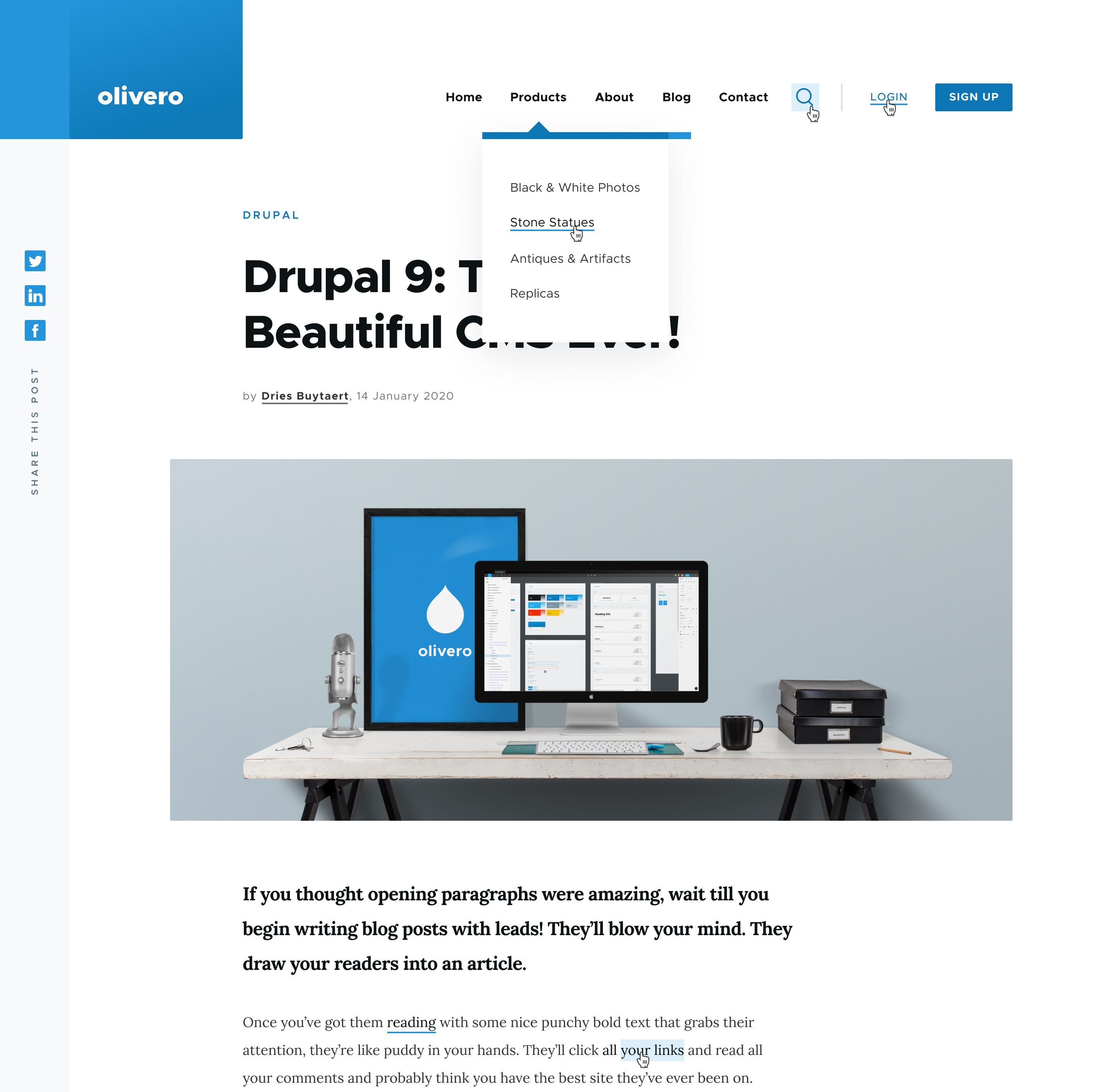What is Drupal?
Drupal is a free community supported framework for creating, organizing, presenting and managing a website. It powers millions of websites and applications from all over the world. Drupal makes it easy for contributors to publish to websites and easy for developers to deploy new sites as well as add features to existing ones.
Most commonly referred to as a content management system, or CMS, Drupal has much more to offer. Drupal installations include a set of modules called Core Components, which provide features such as user management, menu systems, and user contributed content. The Drupal open source community (one of the largest in the world) contributes and supports thousands of free flexible and robust modules and themes, which can be easily integrated into websites to offer powerful features such as multimedia, calendars, rating systems, and other social media tools.
Drupal is also an application framework that can be used to build other aps. Drupal requires no programming skills yet the HTML code produced is accessible, cross browser compatible, and search engine friendly. Drupal is used for every type of site from personal blogs to highly trafficked enterprise level sites. 2% of all websites worldwide are built in Drupal including whitehouse.gov and many other high profile, highly visited sites.
What is Drupal Used for?
Drupal is a great choice for building all manner of websites from simple 1 page personal websites to enterprise level applications. It is particularly well suited to e-Learning systems, Community/social networking sites, and news publishing, where its powerful authoring and publishing features allow administrators to create, revise, and deploy content in a rapid and organized manner. User management, site reporting and statistics, ad management, community management, and other administrative functions utilize an intuitive and robust back-end user interface.
What’s new in Drupal 9.3.0?
The first feature release of Drupal 9 includes the new experimental Olivero frontend theme and various additions to the Claro administration theme. Installer performance is improved 20% and full Composer 2 and PHP 8 support is available. Images with known dimensions are set to lazy-load by default to improve frontend performance.New experimental Olivero theme
A new beta experimental frontend theme has been added to Drupal core called Olivero. This is a new modern and clear theme that is planned to become the new default Drupal theme later (replacing Bartik). Subtheming Olivero is currently not supported, but formal support may be included in the future. The theme is named after Rachel Olivero (1982-2019). She was the head of the organizational technology group at the National Federation of the Blind, a well-known accessibility expert, a Drupal community contributor, and a friend to many.
The theme is named after Rachel Olivero (1982-2019). She was the head of the organizational technology group at the National Federation of the Blind, a well-known accessibility expert, a Drupal community contributor, and a friend to many.
Key additions to the Claro theme
The experimental Claro administration theme introduces designs for various key pages: the extensions administration page, views administration, status report and media library received Claro styled designs.Composer 2 and PHP 8 support
Drupal 9.1 is fully compatible with Composer 2. If you are using Composer 1, now would be a great time to update. Most plugins used on Drupal sites are compatible and/or obsolete with the new version. The memory and performance requirements are reduced dramatically, which should improve your experience. PHP 8 is also supported in Drupal 9, including all of Drupal’s dependencies. There may be contributed projects that are not fully compatible though. Drupal 9 is still compatible with PHP 7.3 and newer. There are various exciting new features in PHP 8, but the JIT compiler and performance improvements are not likely to affect Drupal. Drupal 10 is planned to require PHP 8 in 2022. It is worth examining the support timelines of PHP versions to schedule your platform updates.Other improvements
Installer performance is improved 20%, so getting a new Drupal site set up will be faster. Images rendered by Drupal with known dimensions will be set to lazy-load automatically. This means browsers will only load them when they should appear in the viewport of the user, improving the user experience by making content appear faster. Drupal 10 is planned for mid-2022. While Drupal 9 keeps requiring Symfony 4, Drupal 9.1 includes adjustments required to support Symfony 5 already.How to Choose Top and Reliable Drupal 9.3.0 Hosting Provider?
How to choose a top and reliable web host for Drupal 9.3.0? Choosing the top and reliable web host for Drupal 9.3.0 is not a simple task especially with low price offers. You need to take a large number of factors into consideration, including the Drupal 9.3.0 compatibility, usability, features, speed, reliability, price, company reputation, etc. Therefore, we have established this Drupal 9.3.0 review site, which is designed to help you find the reliable Drupal 9.3.0 host within minutes, based on our specialized editors’ Drupal 9.3.0 hosting experience and real customers’ feedback.
Top and Reliable Drupal 9.3.0 Hosting
ASPHostPortal.com
ASPHostPortal.com offer rock solid Drupal 9.3.0 hosting. They can load and stress test your site against anticipated traffic and recommend the best option for you. They can build your Drupal 9.3.0 hosting platform so that it is highly available, fault tolerant and responds optimally to your end users.
ASPHostPortal.com has Drupal 9.3.0 experts on staffs that are available 24/7 to help, a one click install script to make installation a breeze, and they guarantee their service, money back. ASPHostPortal.com use World Class Plesk Control Panel that helps you with single-click Drupal 9.3.0 installation. The minimal specs of their servers includes Intel Xeon Dual Core Processor, RAID-10 protected hard disk space with minimum 8 GB RAM. You don’t need to worry about the speed of your site. For more detail about top and reliable Drupal 9.3.0 hosting offer, please visit their site at http://asphostportal.com/


